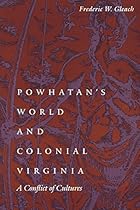

George Dallas Mosgrove was born in Louisville; Kentucky; in 1844; and enlisted in the Fourth Kentucky Cavalry Regiment as a private on September 10; 1862. Through service as a clerk and orderly in both regimental and brigade headquarters; he became familiar with the environment of officers and command. His eyewitness account illuminates the western theater of the Civil War in Kentucky; east Tennessee; and southwest Virginia.
#1340561 in Books University of Nebraska Press 2000-04-01Original language:EnglishPDF # 1 9.00 x .58 x 6.00l; .84 #File Name: 0803270917243 pages
Review
14 of 15 people found the following review helpful. Powhatan's World and Colonial Virginia: A Conflict of CulturBy D. FrazierGleach does a wonderful job of presenting both worlds while maintaining an objective outlook. I have truely enjoyed reading this selection based on that alone. Gleach manages to keep you informed of the details yet helps you to gain new prospective on the view of both cultures. He not only tries to make sense of what happened in the contact period but does a good job of making you understand why it happened the way it did. Not your average Native American/ Colonial Conflict documentary. A wonderful job of teaching the Native side that you never learned in school. Blaming neither side for the outcome Gleach will make hard work of any other writer pulling off one as good.5 of 5 people found the following review helpful. A model of how to do culture(-contact) historyBy Stephen O. MurrayIn this book; Gleach (Cornell University); who was a consultant on Terrence Malick's new movie "The New World;" provides a wise; interesting; and readable analysis of the much-fabled Native American-English encounter in what became Virginia. AMong other things; his analysis makes sense of an incident that most everyone has heard of and many (not least the Disney studio) have sentimentalized: Pocahontas's intervention to save Captain John Smith in 1608.What Gleach does convincingly in this book is to draw on his extensive knowledge of Algonquian(-language-speaking) peoples to interpret the scant records of Powhatan culture and cultural assumptions. To understand Powhatan reactions to the English immigrants; we need to put aside our knowledge of who won in the long run. It was far from obvious to the Powhatan that they were going to be subordinated by aliens who were barely surviving. An earlier attempt to establish a Spanish colony had failed. The Powhatan sought to incorporate the English within their society (the one to which the English had immigrated); though none of the English ever seemed to conceive that "heathen inferiors" believed that they could and should make the rules for uninvited and unruly immigrants to the Powhatan homeland.The English view prevailed; and colonial history has been written from the viewpoint of the winners. As Marshall Sahlins has done for the native Hawaiians' understanding of Captain Cook's incursions; Gleach has recovered a plausible picture of "how natives think" (the title of Sahlins's second book about initial English-Hawaiian contacts). In addition to showing the rationality within their own understandings of the world and proper human interaction of how the Powhatan tried to educate (literally reform) those who thrust into the Powhatan world by drawing on studies of other Algonquian cultures; Gleach also draws on extensive knowledge of English culture ca. 1600 when the Church of England was relatively new and in the English view recently legitimated by the defeat of the Catholic would-be invaders.0 of 0 people found the following review helpful. Understanding colonial historyBy CustomerI don't have time or the resources to sort through the many conflicts in published colonial history. This is where Gleach does me a good service. He presents the evidence and a great bibliography upon which he draws conclusions about the Powhatan world. It's the kind of historical reading I appreciate the most.